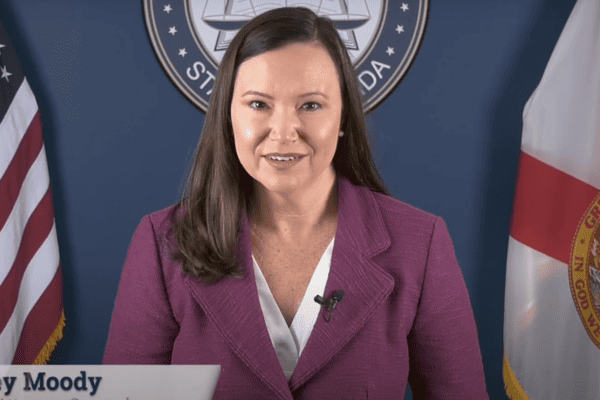DeSantis signs anti-illegal immigration bill on E-Verify, more migrant transports

Lydia Nusbaum contributed to this report.
JACKSONVILLE, Fla. (FLV) – Gov. Ron DeSantis signed an anti-illegal immigration bill on Wednesday, mandating E-Verify, adding money for migrant transports, and increasing penalties for human smuggling.
DeSantis said the Biden administration recently claimed that when it comes to the illegal immigration, “you’ve seen it come down by more than 90%.”
“That is a lie, that is something that they’re trying to feed you and hope their buddies in corporate media will run with, but that is factually untrue and demonstrably untrue,” DeSantis said.
The law makes changes to E-Verify, adds more money for an illegal immigration transportation program and increases penalties for human smuggling.
Rep. Berny Jacques, R-Seminole, and Rep. Kiyan Michael, R-Jacksonville, carried the legislation in the House. Sen. Blaise Ingoglia, R-Spring Hill, sponsored the legislation in the Senate.
“Our Southern Border has been dealing with a manmade crisis under the ineptness of President Biden, allowing more than 6.3 million illegal immigrants to flood our border,” Ingoglia said. “Today, under the leadership of Gov. Ron Desantis, Florida made history signing into law the strongest state-led anti-illegal immigration bill ever brought forth.”
It includes $12 million from the general fund for an illegal immigration program that DeSantis used to send migrants to Martha’s Vineyard last year.
Under current law, E-Verify is only mandated for public employers and their contractors. The law changes the requirement to mandate employers with more than 25 employees use E-Verify. Those with less than 25 employees would need to use the current I-9 process.
If the Department of Economic Opportunity finds that an employer did not use the E-Verify system, then the company could face a fine of $1,000 per day until the situation is resolved.
The state wants to begin tracking how much in taxpayer dollars are spent on illegal immigrants in hospitals that accept Medicaid.
“The state has the right to know how much money is being spent on those who are not here lawfully,” Jacques said previously.
Patients would fill out an intake form asking whether they are legally in the U.S. The answer would not change their ability to receive hospital services.
Hospitals that accept Medicaid would need to provide data on the number of illegal immigrants receiving hospital services and the amount of taxpayer dollars that was spent.
“We can no longer turn a blind eye to what’s happening. It is time for us, the state of Florida to step up and tell the federal government to fix this problem, because we are no longer standing for it,” Ingoglia said.
The act would also repeal state law that allowed an unauthorized immigrant who was brought to the U.S. as a minor to practice law in Florida. The law would not affect the validity of any license to practice law before Nov. 1, 2028.
Rep. Susan L. Valdés, D-Tampa, who is the Democrats’ only Cuban-American legislator, said during session the bill is “cruel” and “without humanity.”
“The provisions of this bill go directly against the values of family and liberty. We as Americans must reject these attacks on communities who cannot make their voices heard,” Valdés said.
The law also prohibits local governments from providing identification cards to illegal immigrants.
On top of this, the legislation enhances human smuggling penalties for those smuggling a minor, more than five people, or when the defendant has a prior conviction for human smuggling.
The law outlines that someone who “knowingly and willfully” transports someone into the state that is here illegally commits a third degree felony.
The analysis said it changes the state’s domestic security statutes to more easily help the federal government enforce federal immigration laws.



